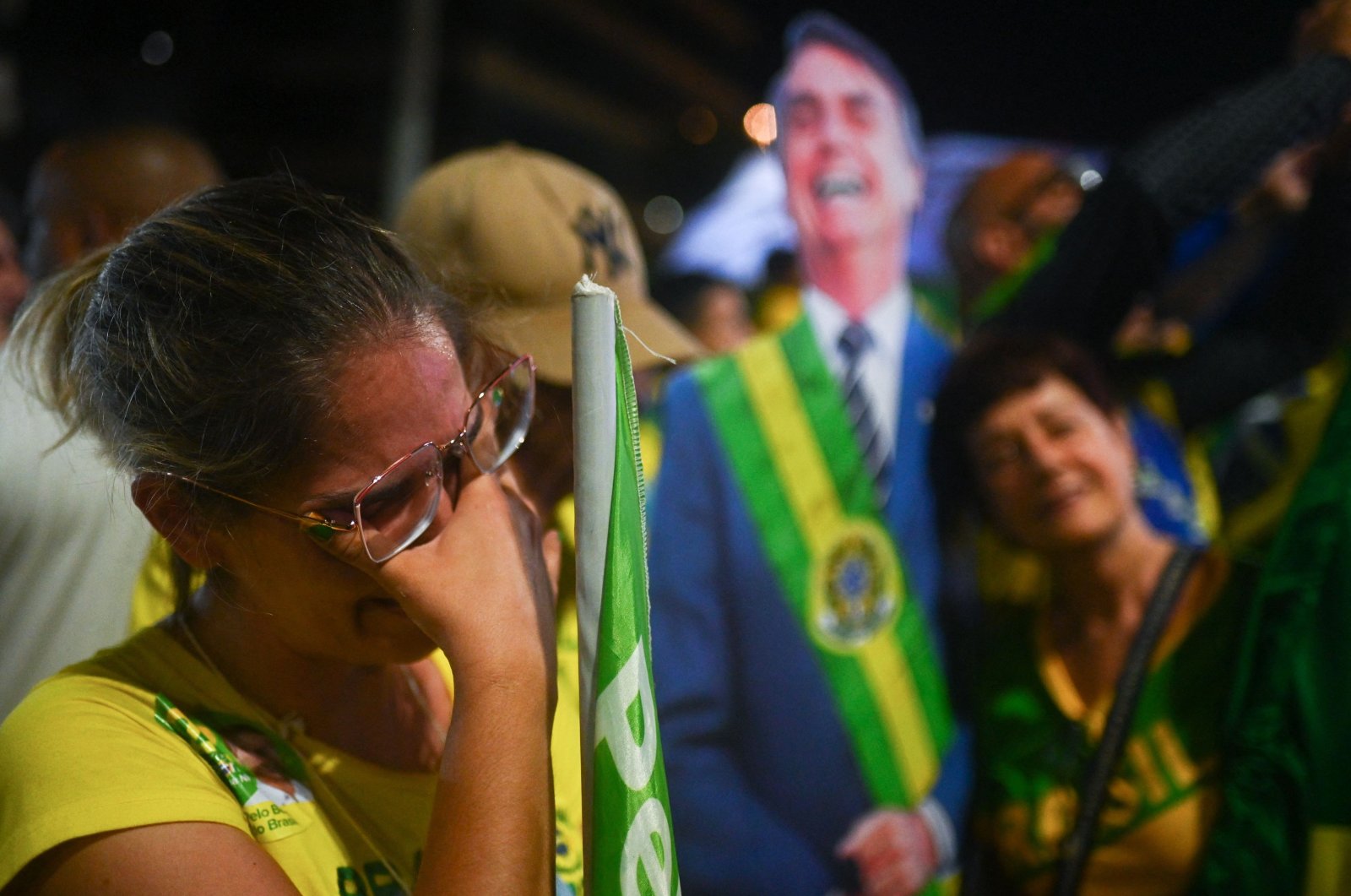
Following leftist Luiz Inacio Lula da Silva's spectacular victory in Brazil's runoff presidential elections Sunday, incumbent Jair Bolsonaro was yet to publicly address his defeat Tuesday.
His silence has raised doubts over whether the far-right nationalist will accept Lula's comeback victory.
Communications Minister Fabio Faria told Reuters that Bolsonaro was holding off on making remarks so he could prepare a speech. But it was not clear if Bolsonaro would concede defeat, as his allies were encouraging him to do.
Brazil is on edge, with pro-Bolsonaro truckers setting up roadblocks throughout the country to protest Lula's return to power. Some truckers posted videos calling for a military coup.
The protests that spread from the first roadblocks in farm states did not immediately disrupt grain shipments by the top food-producing country, but agricultural lobbies warned they may eventually affect exports.
Brazil's federal highway police said 321 protests had partially or fully blocked roads in 26 states. Truckers – who have benefited from Bolsonaro lowering diesel costs – are one of the president's key constituencies, and they have been known to disrupt Brazil's economy when they shut down highways.
Faria, the communications minister, said Bolsonaro was working with his solicitor general to determine measures to clear the highways.
The truckers were hoping Bolsonaro would endorse their roadblocks, but the president's political aides were urging him to accept his electoral defeat to quell the spreading protests, a senior staffer at his campaign headquarters said.
While the president had not conceded, his associates held the first contacts with the Lula camp on a future transition.
Vice President Hamilton Mourao spoke by telephone with Lula's vice president-elect Geraldo Alckmin and recognized Lula's victory, a spokesman for Alckmin said.
Transition talks
Later, Workers Party president Gleisi Hoffmann called Bolsonaro's chief of staff, Ciro Nogueira for what her spokeswoman called a "cordial" and "respectful" conversation.
The outgoing president has yet to call his rival to congratulate him on becoming Brazil's next president.
Lula's win represents a stunning comeback for the 77-year-old former metalworker, who governed Brazil from 2003 to 2010 but then spent time in prison for corruption convictions that were later annulled.
Lula has vowed to overturn many of Bolsonaro's policies, including pro-gun measures and weak protection of the Amazon rainforest.
Environmentalists and sustainable investors cheered Lula's victory and his commitment to protect the rainforest and restore Brazil's leadership on climate change.
Even before he is due to take office on Jan. 1, President-elect Lula will send representatives to next month's COP27 United Nations climate summit in Sharm el Sheikh, Egypt, allied environmentalist Marina Silva said Monday.
In his victory speech Sunday evening, Lula pledged to strongly police illegal logging, mining and land grabbing that have driven the surging destruction of the Amazon rainforest in the past four years under Bolsonaro.
Pitching the contest as a battle for democracy, Lula promised to unite his deeply divided country and celebrated what he called his "resurrection."
"I will govern for 215 million Brazilians, and not just for those who voted for me," Lula said at his campaign headquarters. "We are one country, one people, one great nation."
The Supreme Electoral Court (TSE) declared Lula won 50.9% of votes, against 49.1% for Bolsonaro, who becomes the first Brazilian incumbent to lose a presidential election.
International recognition
Lula's win consolidates a new "pink tide" in Latin America, and means the left will govern all the region's major economies after a string of electoral successes from Mexico to Argentina in recent years.
Argentine President Alberto Fernandez flew to Sao Paulo to meet Lula on Monday and hailed "a new era for the history of Latin America. A time of hope and future that begins today."
U.S. President Joe Biden moved quickly to congratulate Lula, calling the election "free, fair and credible."
Congratulations also poured in from other foreign leaders, including China's Xi Jinping, Russia's Vladimir Putin, German Chancellor Olaf Scholz and French President Emmanuel Macron.
But Bolsonaro's prolonged silence sparked fears over the handover of power.
Markets braced for a volatile week. Brazil's real currency gained more than 2% against the dollar, while the Bovespa was up 0.6% in choppy trading.
Lula's win was a rebuke for the fiery far-right populism of Bolsonaro, who lost support as Brazil ran up one of the worst death tolls of the coronavirus pandemic.
Lula has vowed a return to state-driven economic growth and social policies that helped lift millions out of poverty during his two terms as president.
A former union leader born into poverty, Lula's presidency was marked by a commodity-driven economic boom and he left office with record popularity.
However, his Workers Party was later tarred by a deep recession and a record-breaking corruption scandal that jailed him for 19 months on bribery convictions, which were overturned by the Supreme Court last year.
